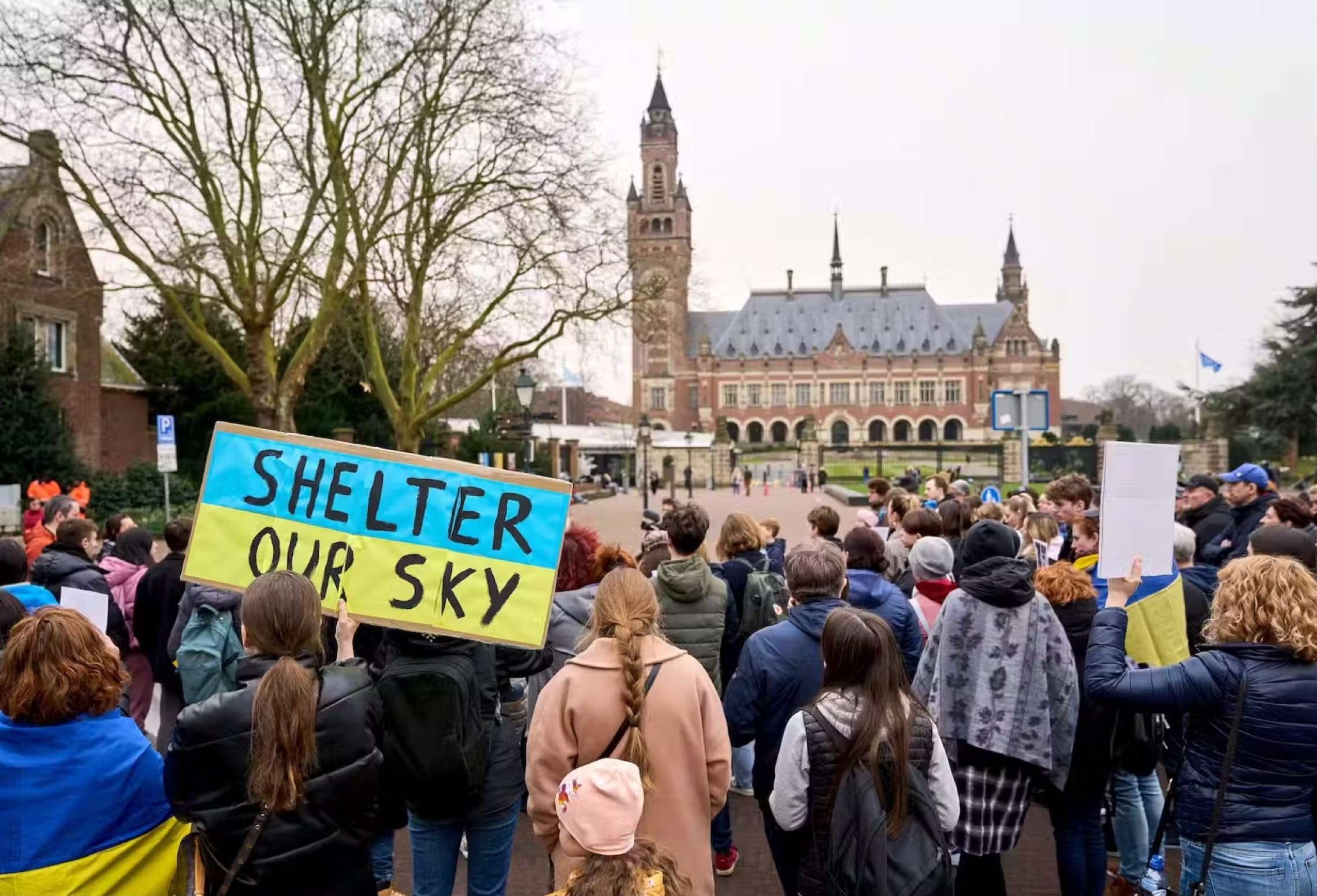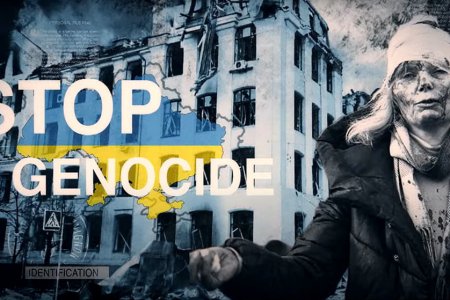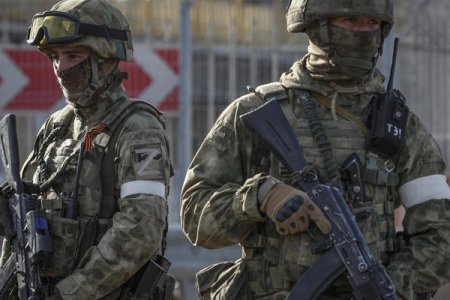
Hearings have begun at the UN International Court of Justice [ICJ] at the Hague in the first case brought by Ukraine against Russia over alleged violation of the UN Convention against Genocide. Ukraine filed this application with ICJ just two days after Russia began its full-scale invasion, with the violation of the Convention on the Prevention and Punishment of the Crime of Genocide [the Convention] specifically referring to Russia’s false accusation of Ukrainian ‘genocide’ as excuse for its act of aggression. This is unlikely to be the only such application over violations of the Convention given the grounds for accusing Russia of waging a genocidal war against Ukraine, however such questions are not part of this case.
The Russian side can scarcely deny the claim about ‘genocide’ as this was heard in Russian president Vladimir Putin’s address at 4 a.m. on 24 February 2022. He asserted that his country’s invasion, which he euphemistically called a ‘‘special military operation’ was aimed at ‘”protecting people who have been subjected to bullying and genocide over the last eight years. And for this we will seek the demilitarisation and denazification of Ukraine”.
Outside of Russian propaganda channels and faked video footage, there is no evidence at all to back such claims, which is undoubtedly one of the reasons why an unprecedented 33 countries subsequently filed ‘declarations of intervention’, effectively seeking to join Ukraine in this case. 32 applications were accepted, with that lodged by the USA rejected as there are parts of the Convention that America has not endorsed.
As always, Russia is seeking to deny ICJ jurisdiction over this case, this time saying that the Convention does not regulate the use of force between two states and claiming that Russia began its invasion “in self-defence”. It seems extremely unlikely that the Court will accept any arguments denying jurisdiction, but Russia achieves a second aim, namely to drag out all such proceedings. It is, after all, over 18 months since the application was filed, and the hearings at presented are merely over Russia’s ‘preliminary objections’.
Russia began the hearings on Monday,18 September, with Ukraine due to present its position on Tuesday. With so many intervening countries, an entire days has been set aside on 20 September for their submissions (in four groups), before Russia again addresses the Court on 25 September, and Ukraine’s presentation ends the proceedings on 27 September.
While Ukraine’s team includes the same international legal experts as its earlier and ongoing case against Russia, the latter’s team is notably short on top names. There are lawyers from Iran, China, Peru, as well as Jean-Charles Tchibaya, a lawyer with a French licence, whose somewhat chequered work record, according to Ukrainska Pravda correspondent Serhiy Sydorenko, includes representing Teodoro Obiang Nguema Mbasogo, dictator of Equatorial Guinea and his family.
Gennady Kuzmin led the team on Monday, claiming that Russia had begun its war “under Article 51 of the UN Statute on self-defence” and that this did not have anything to do with the Convention against Genocide. He referred to “statements from the Russian authorities” about what they called “Ukraine’s discriminatory policy with respect to the Russian-speaking population” and asserted that these could not be illegal and could not violate the Convention. Indeed, he argued that Ukraine’s insistence that there had been no genocide (as Putin claimed, with Ukraine accused of being perpetrator) should have been sufficient to throw the case out as if there were no genocide, then there could be no violation of the Convention.
Since a full video does not seem to be available as yet, the assertions above and below are as presented by Russia’s TASS agency and the pro-Kremlin Izvestia. TASS quotes Kuzmin as going on to largely repeat the standard claims that Russia has been making since 2014 about a supposed “neo-Nazi regime that came to power through a violent coup in 2014” and about the claimed “oppression against the Russian-speaking population”, and a supposed “civil war” in Donbas. Judging by the Izvestia report, he appears to have turned standardly accepted terminology about Russia’s actions since 24 February 2022 on their head by claiming that Ukraine “began a full-scale war against Donbas and circulated a negative attitude to ethnic Russians in 2014”
Russia’s claims about a neo-Nazi regime were condemned back in March 2014 by, among others, prominent Ukrainian Jewish leaders, and the latter have continued to condemn claims about ‘denazification’, etc. There is no evidence for any of the claims, and it is telling that much of the Russian state media presentation of such claims was exposed as based on lies, fake actors, video footage taken from other countries altogether. Russia Today in the UK produced a scurrilous program claiming ‘genocide’, only to swiftly remove it in order to avoid being sanctioned by the media regulator.
The Court has yet to make its final ruling on jurisdiction, but it is hard to imagine that it would have first imposed provisional measures, and then allowed 32 countries to take part in a case it believed was outside its remit.
The provisional measures were announced on 16 March 2022, just hours before Russia’s bloodiest war crime to date, its bombing of the Drama Theatre in Mariupol, in which around a thousand civilians were seeking shelter from Russian attack. ICJ ordered Russia to “immediately suspend the military operations that it commenced on 24 February 2022 in the territory of Ukraine”.
Russia has thus far flouted all ICJ provisional measures against Russia over its behaviour in occupied Crimea and its full-scale invasion. This will not change the importance of a ruling in Ukraine’s favour and the latter will also help with proceedings already underway, as well as future cases against Russian leaders and others at the International Criminal Court.
In May 2022, an independent report by recognized human rights lawyers and scholars warned of a serious risk of Russian genocide in Ukraine and stated unequivocally that this “triggers the legal obligation of all states to prevent genocide.” A detailed analysis was provided of Russia’s “direct and public incitement to commit genocide, as well as of “a pattern of atrocities from which an inference of intent to destroy the Ukrainian national group in part can be drawn.” The authors looked, for example, at the constant denial by high-ranking Russian officials and the state media of the very existence of a separate Ukrainian identity; and at repeated incitement to genocide, with Russia trying to justify this through the false claim that Ukraine had committed genocide in the Russian proxy Donbas ‘republics’ (more details here). Within a month of the report’s publication, former [nominal] Russian president Dmitry Medvedev very publicly expressed ‘doubt’ that Ukraine would still exist within two years.



